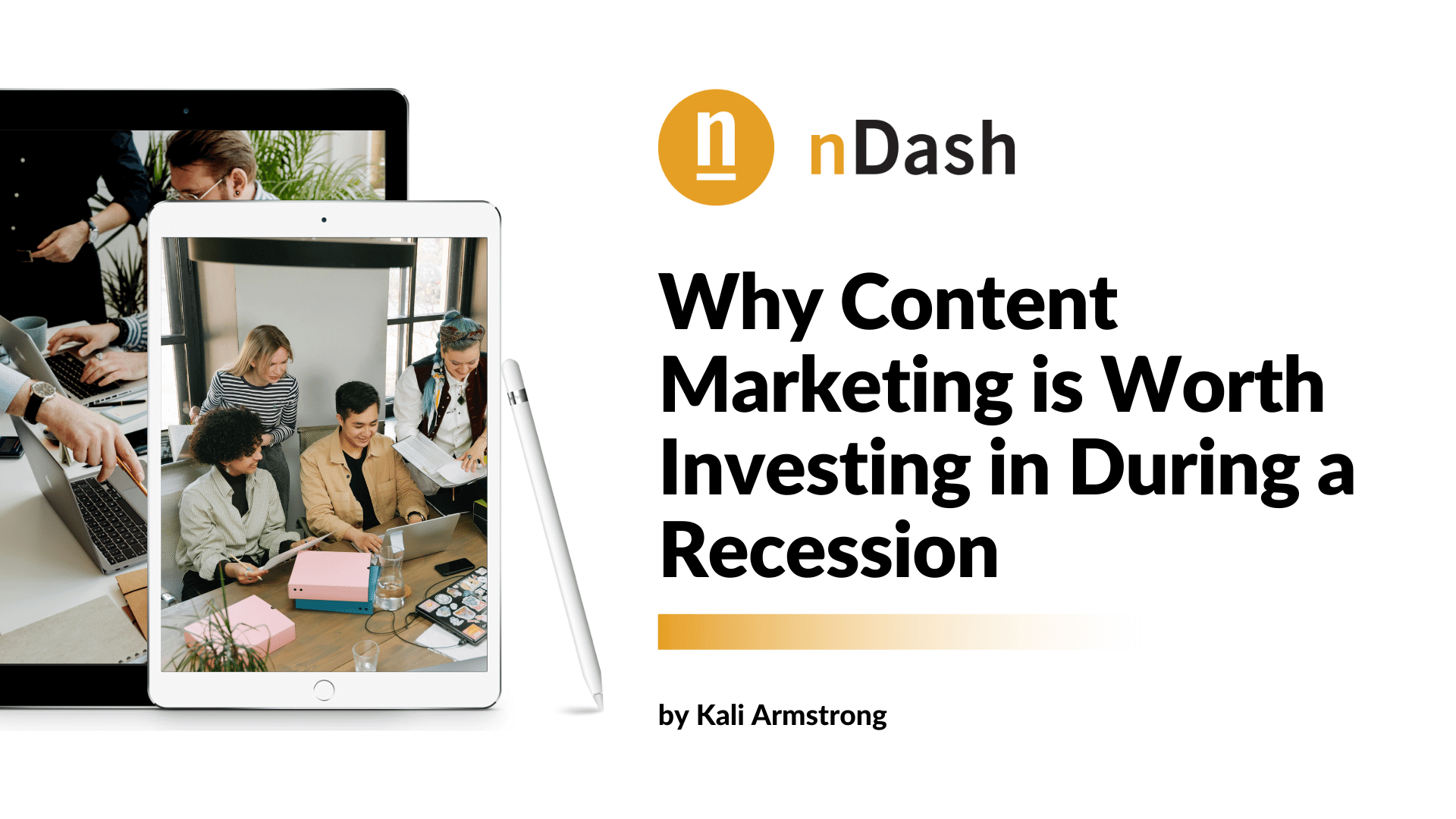Content Marketing Helps Weather This Storm
After carefully navigating the tumultuous waves of the pandemic, small businesses are now facing the biggest wave of all, a recession. While many strategies can help you stay afloat, content marketing is uniquely qualified to weather this storm. So, before you start rationing your resources, read on to learn why content marketing is even more worthy of investment during a recession.
Just Keep Swimming
While cutting costs may help you stay afloat during this recession, your brand won’t be able to move forward without an intentional and continuous effort. I’ve witnessed first-hand how haphazardly businesses cut their marketing budgets (and teams) during economic uncertainty, and I have yet to see any of those businesses come out on top.
I understand the natural inclination to reduce expenditures. The idea that marketing is a “nice-to-have” rather than a “need-to-have” is woefully outdated. The reality is that the modern consumer lives online. Since online queries are free, they’ll likely continue regardless of what happens with the economy.
Your ability to survive (and potentially thrive) as a small business depends on your capacity to keep showing up where your customers need you. That means if they’re online, you need to be too. So how can you do that while being mindful of your bottom line? Two words, content marketing.
Content marketing costs 62% less than traditional advertising and brings in three times the leads. Now, admittedly those are some pretty impressive statistics. But your pre-recession content strategy won’t exactly cut it. To continue providing value during this recession, you must start by adjusting your mindset.
Shift Your Mindset, Not Your Budget
Brand Reputations Outlast Economic Downturns
Your industry and consumer base determine how significantly your brand is affected by this recession. But, your long-term success is heavily influenced by how you respond in the short term. The brands loudly pushing for sales or quietly disappearing from their platforms will come out of the recession with a deflated reputation.
In contrast, the brands that continue showing up and providing value will flourish, even in the industries most vulnerable to economic downturns. The hotel chain, DoubleTree ingeniously demonstrated this concept during the pandemic by revealing their top-secret chocolate chip cookie recipe. This strategic decision likely didn’t lead to sales in the short term as many travel restrictions were in place. But, by sharing the recipe, they provided value during a turbulent time, ensuring they were top of mind once the world reopened for business.
So, although your gut instinct may be to cut back on your marketing budget, focus on the big picture instead — and remember, nothing lasts forever.
Buying Choices Become More Intentional
During economic downturns, newly budget-conscious consumers become extra cautious about where they spend their money. This behavior results in a longer buying cycle as consumers spend more time in the contemplation phase.
Other brands may push promotional content or steep discounts during this time. So, it’s important to focus your efforts on supporting the consumer along their sales journey. Proactively create and share content that answers common questions about your product or service. Doing so shows you’re voluntarily providing the information your audience needs to make an informed decision.
This type of transparency establishes your reputation as a reliable and trustworthy brand, bringing us to our next point.
Trust Becomes a Necessity
When times are tight, consumers can’t afford to be let down by a company that doesn’t deliver on its promises. So establishing yourself as a trustworthy industry leader is critical. It’s important to continue (or even accelerate) your content strategy to provide the reassurance and stability your customers need.
Remember, marketing is a long game, and recessions aren’t the time to be selfish. Show your audience you’re in it for the long haul by being transparent and empathetic.
How to Fine-tune Your Content Marketing Strategy During a Recession
Content marketing is your greatest asset as consumers increasingly search for reassurance and guidance to navigate the recession. So, let’s look at how you can fine-tune your existing strategy to show up for your audience in this altered economic landscape.
1: Focus on Providing Value First
Before you start pumping out content, take a step back and put yourself in the shoes of your ideal customer. Ask yourself questions like:
- How has this recession affected my customers?
- Have their needs and pain points changed?
- How can I best support my customers during this time?
Creating from a place of empathy rather than self-promotion (or preservation) is the difference between companies that flourish and falter. So, get super clear on your target demographic and their modified mindset before publishing anything new.
Remember that recessions aren’t the time to launch or promote new products and features. Instead, it’s a time to hone in on your key offerings and produce content that provides unparalleled value to your audience.
2: Prioritize Your Existing Customers
Even during the best of times, it can cost seven times more to attract a new customer than to retain an existing one. That’s money you can’t afford to waste during a recession. So, instead of cutting your content marketing budget, re-focus your strategy on customer retention by prioritizing the needs of your existing customers.
How do you do that?
Easy, consult your customer service and sales team. Because their roles are customer-facing, they’re constantly receiving feedback and valuable insights that typically don’t make it to the marketing team. Use these insights to identify your existing customers’ most common pain points and queries. Then create personalized content designed specifically for them.
By prioritizing their needs over new prospects, you can drastically improve the customer experience and increase retention rates. Since your existing customers spend more than new ones, a slight improvement in customer retention can increase profits. So, don’t forget to reward your most loyal customers. They’re the ones that will continue to support your business when times get tough and deserve to be valued as such.
3: Upcycle Your Content
I don’t advise cutting your content marketing budget during this time. Performing a content audit’s a great way to ensure the budget you do have goes further. Look for high-value pieces to rework to reflect the current economic climate and anything that speaks to your newly acquired customer insights.
Remember that you must rework or alter the piece for this to be valuable. Nobody wants to see the same piece of content twice, so simply reposting an old blog post from 2018 won’t favor your content strategy. Ensure you’re providing a renewed point of view, format, or at the very least, updated statistics. If your content doesn’t include any of these, it’s not serving you or your audience and should stay exactly where you found it.
4: Content Marketing Must Be Consistent
If you come away with one piece of advice away today, let it be this:
Consistency is key.
Without it, you won’t be able to nurture consumer relationships and build the trust necessary for conversion. It may seem like another tedious task to enlist the help of “an outsider,” but the benefits far outweigh the costs. Nearly 60% of the most successful content marketers outsource at least some part of their content marketing.
The truth is even the best marketing teams will lack certain skill sets. So:
- identify where your team is falling short
- hire a professional with the highly specialized skills you need to fill in the gaps
Not only will this improve the quality and consistency of your content, but it’ll also significantly reduce your workload – making it a win for everyone involved.
nDash Can Help With Your Content Marketing Strategies
Are you working with a smaller team this year? Do you have the time to create the content your audience needs consistently? If you face those challenges, nDash can match you with pre-vetted professionals that will keep your content strategy moving forward.
About the Author:
 Kali is a freelance writer with over six years of experience helping businesses organically expand their reach by creating value-driven content strategically designed to attract premium clientele. Check out her nDash profile today to see how she can help you attract your dream clients by creating the content they crave.
Kali is a freelance writer with over six years of experience helping businesses organically expand their reach by creating value-driven content strategically designed to attract premium clientele. Check out her nDash profile today to see how she can help you attract your dream clients by creating the content they crave.

